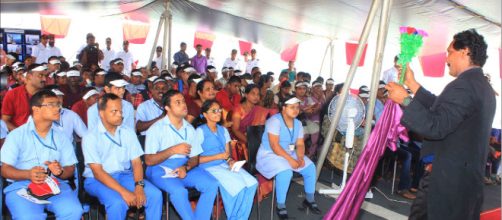With over 1.5 million schools, 260 million enrolments and 12 million teachers, india has one of the most vast education systems in the world. With the view the view that education is key to survival and success being deeply grained within Indian society along with the almost universal access available throughout the country, children are finally able to exercise their right to education.
However the same does not seem to apply to special needs children. There is no official estimate about how many differently abled children they are but it is likely to be over 2.5 million according to campaigners.
Meanwhile, a United Nations report published in 2015 said that 900,000 children with disabilities were out of school confirming the revelations of the 2011 census which showed that 45% of India's disabled population are still illiterate in comparison to 26% of the general Indian population.
The drop out rate for special needs children who are enrolled in school is also considerably higher than that for all children at 48% and 2.6% after grades VIII respectively and 21% compared to 6.8% of all children after grade IX.
What policies are there regarding special needs education?
The Right to Education Act 2008 was brought in to reserve 25% of seats in public schools to be reserved for students coming from economically weaker areas and disadvantaged groups or children with special needs.
However there are numerous stories of public schools simply refusing to accept children with special needs and the 25% comprising of those from deprived socio-economic backgrounds alone.
When special needs children are integrated into public schools, there are also many issues which they have to face. This includes a lack of infrastructural report, special educators, stigma and lack of general awareness.
In response to a lack of accessible infrastructure , the Indian government launched the Accessible India Campaign in 2015 which amongst other targets aims to make schools accessible to 'Persons with Disabilities' (PWD). The campaign website includes a section whereby anyone can register and request facilities for PwD students at a certain school but few are aware of this and therefore don't manage to take advantage of it.
In the same year, the Central Board of Secondary Education (CBSE) made is necessary to all of its affiliated schools to appoint a special educator. However India is currently facing a chronic shortage of special educators. Whilst courses are available, they are often limited to only educating children with hearing and speech disabilities. Additionally, very few teachers take the initiative to learn about how to educate and cater to special needs children.
This was soon followed by the Persons with Disabilities Act 2016, which stated that government-funded educational institutions as well as government-recognised institutions will have to provide inclusive education to children with disabilities after research revealed that being educated in a mainstream school improves outcomes for both disabled and non-disabled children as separate schools would only isolate the disabled and their families further.
2018 has also seen the introduction of self-study mode, relaxation in attendance, a specialised curriculum with a focus on adult outcomes and alternatives to written assignments amongst other features as a result of policy changes by the CBSE.
What is happening now?
Although recently progress has been stalled by debates over whether students with special needs should be in class with typically developing students. The main issue here seems to be the attitude of Indians towards the disabled in general. When a country's Supreme Court thinks it is "impossible" for differently abled and typically developing children to learn alongside each other then we have a problem.
What needs to change?
Stigma still remains regarding disabilities in India as many Indian parents of differently abled children refuse to accept that their child is differently abled, denying them the opportunity of learning in the context which is most beneficial for them.
To counter this prejudice of regarding the disabled as inferior, we must have a truly inclusive education system. One which sensitises society to the needs of special needs children and allows all Indian children to unlock their full potential.


